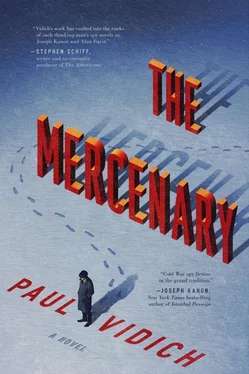“Ballet doesn’t interest me. But you do.”
“There is nothing interesting about me. But ballet is interesting. I will take you, and you will change your mind. Swan Lake is at the Bolshoi. You must come with me.” She smiled. “I was lucky. There is nothing so sad as a prima ballerina who is too old for the stage and too vain to see she’s an ordinary person. She shits like us, and she’ll die like us.” Again, she looked at him and held her gaze there for a moment, before turning back to the windshield. “And what about you? What’s your talent? Everyone has one thing they do well.”
“What am I good at?” He threw out an answer. “I know people.”
She scoffed. “Really?”
“People show themselves in ways they aren’t aware—impatience, anger, nervousness.”
“What do you know about me?”
“I make you nervous.”
She smiled confidently. “I don’t think so. Maybe it’s the other way around.”
“You were nervous in the cemetery. You’re nervous now.”
She shot him a glance.
They were approaching a narrow bridge that crossed a deep ravine. Far ahead, beyond the bridge, in the darkness of the winter storm, he saw a Volga and two UAZ military vehicles blocking the road.
“I’ve made a mistake,” she whispered to herself. Gray apprehension washed her face, and she moved to stop the car.
Later, Garin remembered the moment vividly. The radio had been playing something vaguely like music—mostly static, but calming in the storm for its connection to the world. Then her comment to herself, odd at the time, which drew his attention, and he saw her try to pull over. He felt the brakes lock, and the car entered a sideways skid, turning in gentle rotation, and then came the deafening bang and jolting force of the collision. A sudden explosion of sound that hours later still echoed in his ears.
Their conversation had distracted him, but a premonition came to him as they drove that this was the night he would die. Death would come for him on the remote road she’d taken for no good reason. Fear gripped him, but then the idea settled in an old song. That was when his head hit the windshield.
* * *
THE FIRST SENSATION was an excruciating pain in his neck, which traveled the length of his arm until his fingers tingled from numbness. He willed movement in his fingers, slowly clenching and unclenching a fist, working the hand to prove he could use it. He felt an old fear trying to get his attention, and he felt death lurking nearby, angry and cheated.
The car had slammed into a guardrail and was tipped forward. Beyond the bridge he saw the three parked vehicles, headlights illuminating the forest.
Natalya was slumped over the steering wheel, unconscious. Her head had struck the windshield, cracking it, and she bled from her lip. His first thought was that she was dead. He placed two fingers on her carotid artery and found a weak pulse. He was suddenly alert.
The car’s engine was stopped and the wipers were frozen, but one wheel spun freely. His door was badly sprung, but he forced it open with his shoulder, exciting a screech in the metal. He circled the car, and when he came to the driver’s side, he saw that one front wheel hung over the embankment, rotating slowly. It was a long drop to the frozen river below. Snow was falling heavily, and river water breathed out cold in the narrow channel cut into the pack ice. Gentle snowflakes softened the violence of the moment. He listened for more danger, but there was only gurgling water. He looked again at the Volga and military vehicles. They seemed unaware of the accident. Garin considered running to them for help, but instinct told him to stay where he was.
“Natalya.” He looked at her face. Nothing. “Natalya!”
She needed medical help. He got her to the passenger seat with some careful lifting and sliding over the stick shift. He was close to her face, and he felt her weak cooperation, but her eyes remained closed. When she was seated, he wiped blood from her split lip.
The Lada started on the third turn of the key. He kept the headlights off, rehearsing gear movements in the dark, until he found reverse. The engine warmed up, and then he eased his foot onto the gas pedal. It surprised him that the wheels didn’t spin. He applied more power and eventually coaxed the car backward until he felt the front wheel top the embankment. He stopped the car when he was off the edge. The immediate danger was gone.
For several minutes, he drove without headlights, leaning his head out the window to discern the road. Their earlier tire tracks were already disappearing in the falling snow. When he was certain they were beyond view of the parked vehicles, he turned on the headlights and increased their speed, following the tunneling beams through the dark night. He understood that everything that day, and the day before, had been arranged. Stupid , he thought . Foolish .
While he was trying to make sense of things, Natalya stirred, her eyes opening. She seemed confused and tried to speak.
“Don’t talk.”
“Are you okay?” she whispered.
“Me? You’re the one who’s hurt.”
She touched her mouth and saw blood on her hand. He gave her his handkerchief.
“What happened?” she asked.
“You braked. We skidded. The car hit a guardrail.”
She clutched his arm and sat up. “I remember.” But he knew that she didn’t.
“Your head hit the windshield.” He pointed to the cracked windshield. “Dizzy?”
“No.”
They had arrived at the intersection where she’d turned off the main road. “Which way do I turn?” he asked.
“It will take hours to reach Moscow in this storm. We must return to the village. I’ll drive.”
“You’ll kill both of us. Which way do I turn?”
They were the only car on the road during the hour-long drive. The crash, her injuries, the entombing storm, and a near-death experience shattered all pretense of formality between them. Her head lay on his shoulder in a fragile truce, and they settled into a quiet that stretched on with the distance they traveled.
After a long stretch, Garin looked over and saw that she had slumped forward, blood leaking from her nose. He called her name and got no response. There would be trouble if the car was stopped and they found a dead woman. Questions would be asked, and his cover would combust. How could this happen, his life transformed by events that he failed to foresee? He slammed the steering wheel with his palm. Shit.
Garin put two fingers on her carotid artery and found a pulse. It crossed his mind to leave her in the snow, but his heartlessness didn’t extend to murder. He drove faster and took the turns recklessly.
The village of Koltsovo appeared first as a faint glow through the curtain of snow, but then there were houses on either side, and he found himself moving through unplowed streets. Garin roused Golukov, who came to the front door in a long robe and cotton nightcap with a candle. The two men helped Natalya to a bedroom off the kitchen that had been hastily prepared. Garin waited at her side, angry and resentful, as the housekeeper buzzed about excitedly. Water was boiled for aromatic potions made from herbs, and black tea was brewed. The housekeeper was sent into the storm to fetch the doctor, who had gone to attend a pregnant neighbor.
Through all of this, Natalya lay on the bed under a deep comforter, her pale skin jaundiced by the flickering candle. Electricity had been knocked out by the storm.
* * *
GARIN HEARD A cock trumpeting dawn outside. Then he opened his eyes to sunlight that pierced the treetops and streamed in the window, blinding him. Bit by bit, he became aware that he was slumped in a hard, wooden chair and in the moment of waking his unpleasant dream took wing and vanished. He sat up.
Читать дальше












